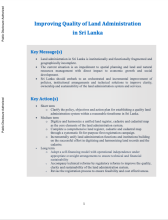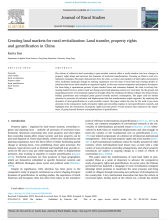/ library resources
Showing items 1 through 9 of 7904.Land administration in Sri Lanka is institutionally and functionally fragmented and geographically incomplete. The current situation is an impediment to spatial planning and land and natural resources management with direct impact to economic growth and social development.
ABSTRACTED FROM EXECUTIVE SUMMARY:
This review does not attempt to be comprehensive. Instead, we highlight:
-
benchmarks in the evolution of land use policies in Sri Lanka;
Street trees, native plantings, bioswales, and other forms of green infrastructure alleviate urban air and water pollution, diminish flooding vulnerability, support pollinators, and provide other benefits critical to human well-being.
In West Africa, where the majority of the population relies on natural resources and rain-fed agriculture, regionally adapted agricultural land-use planning is increasingly important to cope with growing demand for land-use products and intensifying climate variability.
In a context of aging, low fertility, and progressive slowdown of both internal population mobility and international migration at working age, residential mobility at older ages was regarded as an emerging phenomenon in Mediterranean Europe, a region with increasingly attractive retirement place
Land is one of the important input resources in a highly populous and land-scarce country such as Bangladesh. When different factors change (such as, geophysical, proximity, socioeconomic and climatic), there are dramatic changes in the spatial pattern of land uses.
The reform of collective land ownership in post-socialist contexts offers a useful window into how changes in property rights shape and structure the dynamics of territorial transformation.
Based on a theoretical discussion from global perspective the paper describes present rural land administration and management structure in Bangladesh. Bangladesh is a land scarce country with high-density population.
The Agriculture Census 2019, the sixth in its series, is an agricultural statistical venture of Bangladesh Bureau of Statistics (BBS). Not only has Bangladesh recorded persistent economic growth of 7.86 to 8.13%, but it has also achieved a substantial reduction in poverty rate.
Paginação
Land Library Search
Through our robust search engine, you can search for any item of the over 73,000 highly curated resources in the Land Library.
If you would like to find an overview of what is possible, feel free to peruse the Search Guide.








